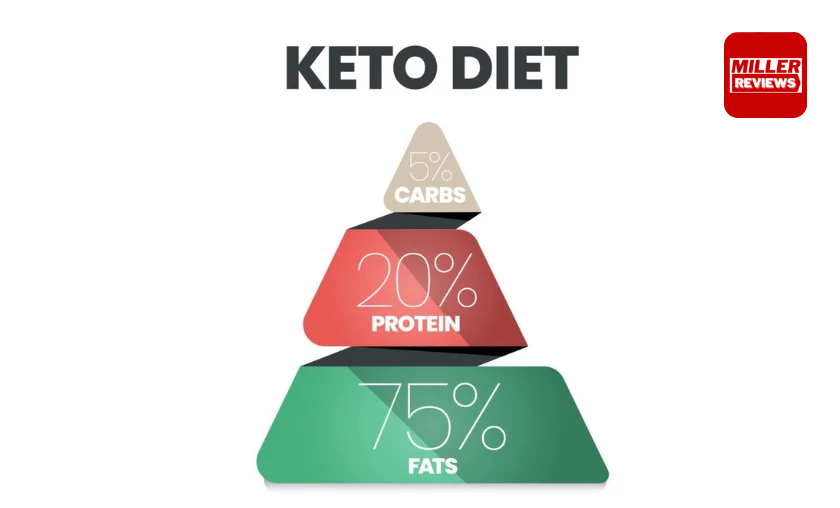Low-Carb Diet You know, there’s just so much misinformation floating around when it comes to low-carb diets. You need to know about it. It’s like everyone has their own opinion, and they’re all over the place. Some folks swear by it, claiming it’s the holy grail of human nutrition, while others dismiss it as nothing more than a passing trend that could do more harm than good. But let’s set the record straight, shall we? I’m here to debunk nine common myths about low-carb diets once and for all.
Brace yourself because we’re about to dive into the truth behind the buzz.
Table of Contents
They’re Only a Fad

Let’s talk about the term “fad diet.” It used to be reserved for those crash weight loss schemes that gained momentary fame. But these days, people toss it around carelessly, even when it comes to diets that simply haven’t gained widespread cultural acceptance, like low-carb diets.
But let me tell you something, my friend. Low-carb eating has a solid foundation of scientific evidence backing it up. We’re talking about more than 20 studies that have demonstrated its effectiveness. And it’s not some new kid on the block, either. This way of eating has been popular for decades. Believe it or not, the first Atkins book hit the shelves in 1972, a good five years before America’s first low-fat dietary guidelines were introduced.
And if we really want to go way back, let’s talk about William Banting. He published the first low-carb book in 1863, and let me tell you, it caused quite a sensation at the time.
So when you think about the long-term success and the scientific backing of low-carb diets, dismissing it as a mere fad just doesn’t hold up. It’s time we set the record straight.
SUMMARY:
To sum it all up, fad diets may enjoy their brief moments in the limelight, but the low-carb diet has been steadfast for decades, supported by a wealth of high-quality studies.
Hard to Stick

Let me address the common claim made by opponents of low-carb diets. They often argue that these diets are just not sustainable because they restrict certain food groups. Supposedly, this leads to a sense of deprivation, causing people to give up on the diet and regain the weight they lost.
But hold on a moment, my friend. Here’s the thing: all diets have restrictions. Some restrict specific food groups or macronutrients, while others limit overall calorie intake. It’s just the way it goes.
Now, here’s where low-carb diets have a leg up. They have been proven to reduce appetite, allowing you to eat until you’re satisfied and still shed those pounds. You heard me right. You can feel satiated while on a low-carb diet and still lose weight. My friend, it’s backed by scientific evidence, not just some empty claim (check out sources 2 and 3).
On the other hand, let’s talk about calorie-restricted diets. They often leave you feeling less than fully satisfied, leading to constant hunger. Now, is that sustainable for most people? I think not.
So here’s the bottom line: scientific evidence does not support the notion that low-carb diets are harder to stick to than other diets. In fact, they offer you the opportunity to eat until you’re satisfied while still achieving your weight loss goals. Now that’s what I call sustainability.
SUMMARY:
To sum it all up, my dear, science is on our side. Low-carb diets are not these impossible endeavors. They allow you to eat until you’re content while still shedding those extra pounds. It’s a win-win situation, and the evidence speaks for itself.
Most of the Weight Lost Comes from Water Weight

Let’s talk about how your body stores carbs. You see, your muscles and liver hold quite a stash of them. They store a form of glucose called glycogen, which acts as a source of glucose for your body in between meals. Now, here’s where it gets interesting. The stored glycogen in your liver & muscles has a tendency to bind with water.
So, when you reduce your carb intake, your glycogen stores go down, and you bid farewell to a significant amount of water weight. It’s like a weight loss party happening right in your body.
But that’s not all. Low-carb diets also have a powerful effect on insulin levels. They cause them to plummet, which in turn signals your kidneys to flush out excess sodium and water. My friend, it’s like a double whammy (check out sources 4 and 5).
Now, here’s where things get interesting. Some folks argue that the weight loss advantage of low-carb diets is solely due to this reduction in water weight. They claim it’s all smoke and mirrors. But let me tell you, the truth goes beyond that.
Studies have shown that low-carb diets do more than just shed water weight. They also target body fat, especially stubborn belly fat and the fat hanging out in your liver (sources 6 and 7). It’s a real fat-fighting powerhouse.
For instance, a study spanned six weeks, and guess what? Low-carb dieters lost a whopping 7.5 pounds (about 3.4 kilograms) of fat while gaining 2.4 pounds (around 1.1 kilograms) of muscle. Now, that’s quite the body transformation. (source 8).
SUMMARY:
So, to sum it all up, when you embrace a low-carb lifestyle, you bid farewell to excess water weight. But it doesn’t stop there. This way of eating also targets body fat, particularly that troublesome belly fat and liver fat. It’s like a dynamic duo fighting the battle of the bulge.
Bad for Your Heart

Let’s know the claim that low-carb diets are cholesterol and fat factories. These diets are often criticized, with many suggesting that they can raise your blood cholesterol levels and increase the risk of heart disease.
But wait, my friend, because here’s the twist. Some studies have indicated that neither dietary cholesterol nor saturated fat significantly impacts your heart disease risk (check out sources (9, 10, 11, and 12). It’s like rewriting the script.
But here’s what’s even more important: low-carb diets may actually improve several critical factors associated with heart disease risk (source 13). Let me break it down for you:
- They can significantly decrease blood triglycerides: You know those troublesome little fat molecules floating around in your bloodstream? Low-carb diets can work their magic and bring those levels down (sources 14 and 15).
- They can increase HDL (good) cholesterol: We all love that “good” cholesterol, don’t we? Low-carb diets have the potential to boost those levels and give your heart a reason to smile (sources 16 and 17).
- They can lower blood pressure: When it comes to keeping your heart in good shape, maintaining healthy blood pressure levels is crucial. And guess what? Low-carb diets can lend a helping hand (source 18).
- They can decrease insulin resistance: Insulin resistance plays a significant role in heart disease risk. Low-carb diets can help regulate blood sugar and insulin levels by reducing resistance, keeping you on a healthier path (sources 19 and 20).
- They can reduce inflammation: Inflammation is a sneaky culprit that can wreak havoc on your heart. But fear not because low-carb diets have been shown to have anti-inflammatory effects (source 21).
Here’s an intriguing fact: LDL (bad) cholesterol levels typically don’t increase. And not only that, these particles often transform from harmful, small, dense shapes into larger ones — a process linked to a reduced risk of heart disease (sources 22 and 23). It’s like a positive makeover for your cholesterol.
SUMMARY:
To sum it all up, my dear, there is no evidence to suggest that dietary cholesterol and saturated fat cause harm. In fact, studies on low-carb diets demonstrate their ability to improve key risk factors for heart disease. It’s like a heart-healthy upgrade in progress.
They Only Work because People Eat Fewer Calories

Let’s look deep into the claim that weight loss on low-carb diets is solely due to reduced calorie intake. Yes, it’s true, but there’s more to the story than meets the eye.
The actual weight loss advantage of low-carb diets lies in the automatic nature of it all. You see, people on these diets often feel so satiated and full that they naturally eat less food without meticulous calorie counting or portion control. It’s like a built-in portion control mechanism.
But wait, there’s more. Low-carb diets tend to be rich in protein, which can boost your metabolism. That slight increase in calorie burning can make a difference (check out sources 24 and 25). It’s like giving your body a little extra oomph.
Now, here’s the exciting part. Low-carb diets aren’t solely about shedding pounds. They can also be highly effective in managing various health conditions. Take metabolic syndrome, type 2 diabetes, and epilepsy (sources (26, 27, 28, and 29). In these cases, the benefits of low-carb diets go beyond mere calorie reduction.
SUMMARY:
To sum it all up, my friend, while low-carb diets do result in reduced calorie intake, the fact that it happens subconsciously is a significant advantage. These diets also have a positive impact on metabolic health. So, it’s about more than just the numbers on the scale but overall well-being.
They Reduce Your Intake of Healthy Plant Foods

Let’s clarify something right off the bat: a low-carb diet is not the same as a no-carb diet. It’s time to debunk the myth that cutting carbs means bidding farewell to all plant foods.
In reality, my friend, you can enjoy generous portions of vegetables, berries, nuts, and seeds while still keeping your daily carb intake under 50 grams. It’s like having the best of both worlds.
But wait, there’s more. Even if you consume 100–150 grams of carbs per day, it’s still considered low-carb territory. This means you can savor several pieces of fruit each day and even indulge in small amounts of healthy starches like potatoes and oats. It’s about finding that balance, you see.
Now here’s an exciting revelation: you can embrace the low-carb lifestyle even if you follow a vegetarian or vegan diet. It’s entirely possible and sustainable to keep those carbs in check while nourishing your body with plant-based goodness.
SUMMARY:
To sum it all up, my dear, don’t be fooled into thinking that low-carb means no plant foods. You can have your fill of vegetables, berries, nuts, and seeds even with a very low carb intake. It’s all about making smart choices and enjoying the abundance of healthy plant foods available to you.
Ketosis is a Dangerous Metabolic State

Let’s clear up the confusion surrounding ketosis, my friend. A fascinating metabolic process occurs when you consume very few carbs, typically fewer than 50 grams per day.
As your carb intake drops, your insulin levels decrease, and your fat cells release a significant amount of stored fat. This flood of fatty acids reaches your liver, which then transforms them into what we call ketone bodies or ketones. These molecules are remarkable because they can pass through the blood-brain barrier and provide a source of energy for your brain during periods of carb scarcity or fasting.
Now, here’s where things get muddled. Many people mix up the terms “ketosis” and “ketoacidosis.” Allow me to set the record straight.
Ketoacidosis is a dangerous metabolic state that primarily occurs in unmanaged type 1 diabetes. It involves excessive ketones flooding your bloodstream, leading to an acidic environment. It’s a serious condition that can have fatal consequences, and it’s essential to seek immediate medical attention if you suspect ketoacidosis.
However, please note that this is entirely unrelated to the ketosis induced by a low-carb diet. The ketosis resulting from a low-carb diet is a healthy metabolic state, offering a range of benefits.
In fact, ketosis has demonstrated therapeutic effects in conditions such as epilepsy and is being investigated for its potential in treating cancer and brain diseases like Alzheimer’s (sources 28, 29, and 30). It’s like unveiling the hidden powers of ketosis.
SUMMARY:
To summarize, my dear, a very low-carb diet leads to the beneficial metabolic state of ketosis. It’s crucial to understand that ketosis and ketoacidosis are not interchangeable. Ketoacidosis is dangerous and occurs in unmanaged type 1 diabetes, while ketosis from a low-carb diet is a healthy and advantageous state for your body.
Your Brain Needs Carbs to Function

Let’s dive into the fascinating world of brain function, my friend. There’s a common belief that your brain is reliant on dietary carbs to function optimally. It’s often claimed that your brain has a preference for carbs and requires around 130 grams of carbs each day. While there is some truth to this, the story doesn’t end there.
Indeed, certain cells in your brain can only utilize carbs in the form of glucose as their fuel source. However, here’s the exciting part: other parts of your brain can utilize ketones.
When carb intake is significantly reduced to induce ketosis, a substantial portion of your brain switches from using glucose to utilizing ketones as an alternative fuel source. It’s like tapping into a different energy reserve.
But wait, there’s more to the story. Even when blood ketone levels are high, certain parts of your brain still require glucose to function. This is where gluconeogenesis, a metabolic pathway, comes into play. In the absence of dietary carbs, your body, primarily your liver, can produce glucose from protein and byproducts of fat metabolism. It’s a clever mechanism that ensures your brain receives the glucose it needs, even on a low-carb diet.
My dear, thanks to the combined powers of ketosis and gluconeogenesis, you don’t necessarily need dietary carbs to fuel your brain. Once you adapt to a low-carb diet, many individuals even report experiencing improved brain function, as if their mental faculties are operating at their best.
SUMMARY:
To summarize, on a low-carb diet, a portion of your brain can thrive on ketones as its fuel source. Meanwhile, your body has the ability to generate the small amount of glucose required by other parts of your brain. It’s a fascinating interplay between different metabolic processes, showcasing the adaptability and resilience of the human body.
They Destroy Physical Performance

Let’s unravel the truth about carbs and physical performance, my friend. It’s widely believed that athletes must fuel themselves with a high-carb diet to excel in their endeavors. The notion is that carbs are indispensable for optimal physical performance. While this claim has some initial truth, the full picture is more nuanced.
When you reduce your carb intake, it’s true that your performance might initially suffer. It takes time for your body to adapt to relying on fat as its primary source of fuel instead of carbs. But fear not, for this dip in performance is typically temporary.
Numerous studies have shed light on the benefits of low-carb diets for physical performance, especially when it comes to endurance exercise. However, it’s important to allow yourself a few weeks to adapt to the new dietary approach (trustworthy sources confirm this!). Patience is key.
Furthermore, some studies suggest that low-carb diets promote muscle mass and strength, contrary to the misconception that they might hinder these aspects of physical performance (trustworthy sources back this up, too!).
SUMMARY:
To summarize, low-carb diets are not most individuals’ nemesis of physical performance. With a little time and adaptation, your body can thrive on this approach. In fact, it can even enhance endurance exercise and contribute to muscle growth and strength. Remember, give yourself those few weeks to adapt and embrace the full potential of a low-carb lifestyle.
Conclusion
Low-carb diets can truly bring about remarkable health benefits. They work wonders for individuals grappling with obesity, metabolic syndrome, and type 2 diabetes.
However, it’s important to note that they may not be suitable for everyone.
Nevertheless, numerous prevailing misconceptions surrounding low-carb eating are nothing more than pure falsehoods.
For More amazing articles related to Health Check out our website Over Here
To Read more similar articles click here
Thanks for visiting our Website. If you appreciate our work, kindly show us some support in our comments section 🙂